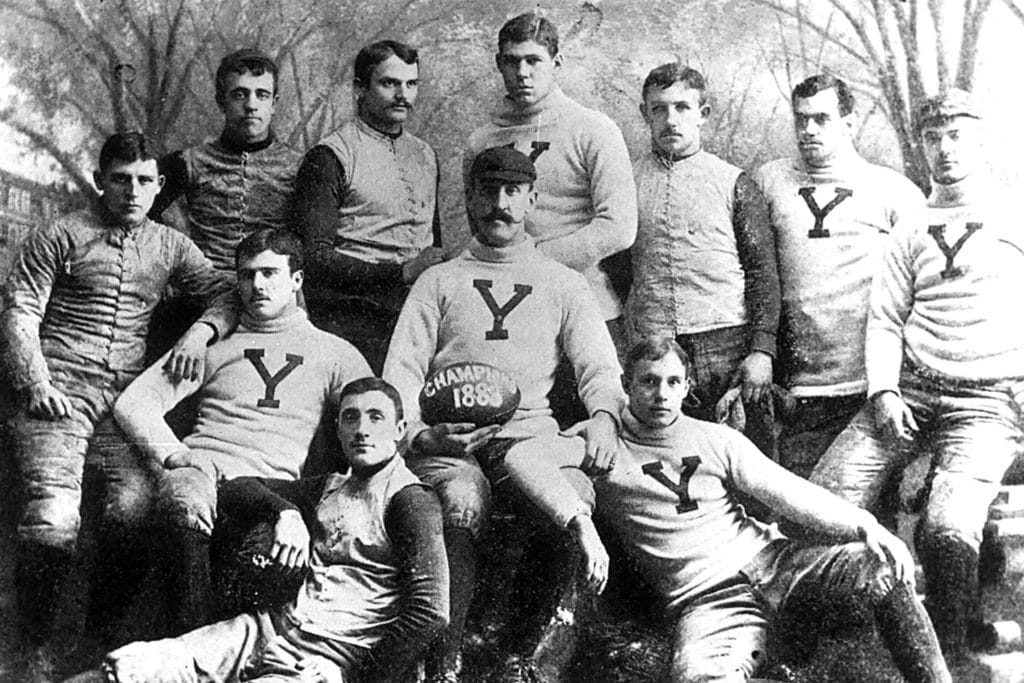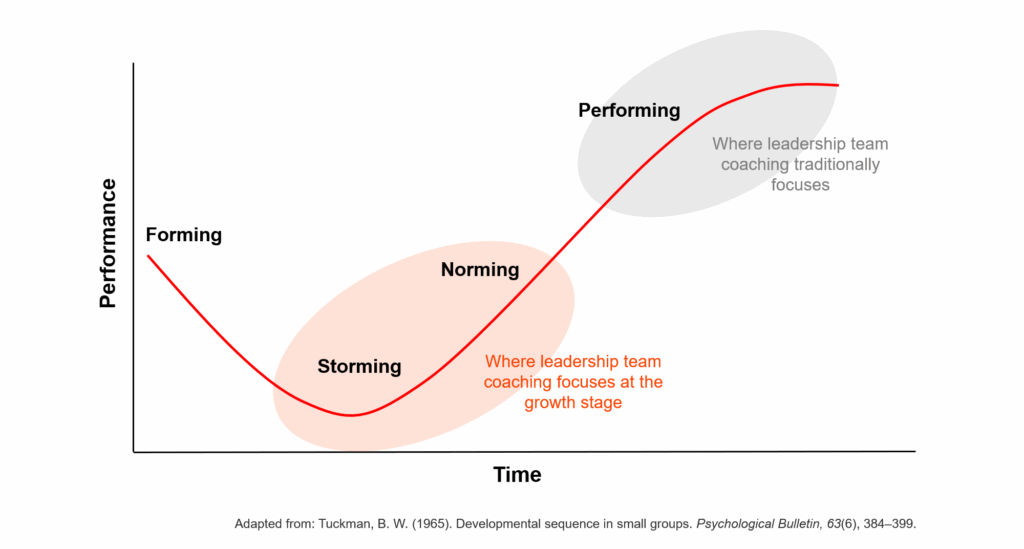In his 2017 TED Talk Want to get great at something? Get a coach, Atul Gawande tells the story of the Harvard and Yale American-rules football teams: “In 1875 Harvard and Yale played their first game. Yale hired a coach Harvard did not. The results, over the next three decades Harvard won just four times. Harvard hired a coach”. Every high performing sports team has a coach, why doesn’t every leadership team?
Let’s explore the role of leadership team coaching in startup and high growth technology businesses: what it is, what challenges and opportunities can it help address, and how can you embrace it to support the growth of your company and your executive team. We’ll learn how some of the most successful technology companies in the world, like Google and Apple, used leadership team coaching in their earlier stages of growth to incredible effect, and how you can too.

Table of Contents
What is leadership team coaching?
Sir John Whitmore is one the founders of modern coaching. As he explains, coaching involves “unlocking people’s potential to maximise their own performance”. It’s helps people to learn rather than being directly taught. Rather than being told what to do, people who experience coaching “acquire the facts, not from the coach but from within [them]self, stimulated by the coach”. Though most coaching takes place one-on-one, it can work just as effectively amongst a team.
Good [team] coaching helps a group move toward becoming a real team by bringing the hidden dynamics out so they can be managed. As long as the critical challenges of creating a team remain “not discussable” they cannot be managed. Full team member engagement won’t occur unless each member of the team can trust that the conversation will not result in harm to their objectives or to their future prospects. While some CEOs can do this by the rules they establish for interaction and the way they model transparency, many top leaders recognize that this is not something they want to tackle on their own.
Centre for Creative Leadership Whitepaper – Senior Leadership Team Coaching
Why is leadership team coaching important?
To answer this question, it’s important to understand the stages of leadership team development as it relates to teams in more traditional corporate businesses, versus startup and high growth technology businesses.

In 1965, Bruce Tuckman described 4 stages of development: 1) Forming, 2) Storming, 3) Norming and 4) Performing. Now over 50 years old, the model is not without its critics, who argue that it’s a linear over-simplification, but it still provides a helpful visualistion of the development journey that many leadership teams go through.
According to team coaching expert David Clutterbuck, “team coaches typically come in to help groups that have either never become a team, or teams which have become stale”. But high growth technology businesses are different. Teams have not had the chance to form properly, yet alone become stale. The early days of building a business are scary but novel and exciting. With scale comes a more complex reality. Growth businesses change at a frenetic pace and leadership teams can find themselves rapidly falling apart before they’ve even had chance to come together properly in the first place.
How does leadership team coaching work?
A coach works with the whole team to address these areas. They don’t ‘bring the answers’ in the way that a consultant might, though they should be able to add the benefit of their expertise if you would like it. Instead, they facilitate an enquiry-led conversation:
- Does the group have clarity on the strategy? Can the CEO articulate it to the team? Have the right people contributed to it? Can the team replay it? Is everyone bought in?
- Who is responsible for what? With roles and responsibilities constantly changing in the early days of growth, can team members articulate theirs? Are there gaps or overlaps? How will they be addressed?
- Do you have the right people on the team? Diverse teams are more effective on practically every measure.
- Does the team have the right complimentary skills? What’s missing? Where will the team find the skills it needs; from within, or externally?
- How does the team make decisions? What are the blockers to good decision making?
- Is the team prioritising the right things? What is the team not discussing that it should be? What is it spending too much time on that isn’t that important, and vice versa?
- What does the team disagree about? Too much disagreement is obviously unhelpful but research shows that a healthy amount of disagreement and conflict is good.
- What is the leadership culture? What does it mean to be a leader to be in this business? How do you define your leadership culture in the context of the business’s overarching company culture?
- How do individual members of the group want to be treated? How will everyone work together in a way that ensures mutual respect? What boundaries are we setting and agreeing to?
A leadership team coach will help you identify and unpack issues in an objective and professionally facilitated way, where team members are really encouraged to listen to what their colleagues have to say. Perspectives shift, new ideas form, alignment follows. A coach will take the whole team journey beyond just the practical challenges of business growth, to a psychologically safe place, a group-level phenomenon at the heart of which is trust. Together, you’ll identify and seek to address any ‘tension in the machine’:
To balance the tension and mould a team into a community you need a coach someone who works not only with individuals but also with the team as a whole to smooth out the constant tension, continuously nurture the community, and make sure it is aligned around a common vision and set of goals. Sometimes this coach may just work with the team leader, the executive in charge. But to be most effective, the coach works with the entire team.
Trillion Dollar Coach: The Leadership Handbook of Silicon Valley’s Bill Campbell
“An objective observer is more likely to detect our errors than we are,” says Daniel Kahneman in Thinking Fast & Slow. Taking a systemic, objective view, a leadership team coach can also sensitively call out the biases that they are trained to see and help the team navigate through them.
Want to build a better leadership team? Get a coach
The value of a high-performing team has long been recognized. It’s why savvy investors in startups often value the quality of the team and the interaction of the founding members more than the idea itself. It’s why 90 percent of investors think the quality of the management team is the single most important nonfinancial factor when evaluating an IPO. And it’s why there is a 1.9 times increased likelihood of having above-median financial performance when the top team is working together toward a common vision. “No matter how brilliant your mind or strategy, if you’re playing a solo game, you’ll always lose out to a team,” is the way Reid Hoffman, LinkedIn cofounder, sums it up. Basketball legend Michael Jordan slam dunks the same point: “Talent wins games, but teamwork and intelligence win championships.
High-performing teams: A timeless leadership topic, McKinsey 2017
The characteristics of high performing teams might be well understood, and their competitive advantage clear, but creating and continually nurturing them is hard. Seeing the system when you are part of the system can be hard. So too can admitting that you have a problem. If you are a CEO or people lead in a growth stage business who is grappling with the types of leadership team dynamics discussed here then get in touch.
Enquire about Executive Coaching
Hello, I’m Richard Hughes-Jones.
I’m an Executive Coach to founders, CEOs and senior technology leaders in high-growth technology businesses, the investment industry and progressive corporates. Having often already mastered the technical aspects of their craft, I help my clients navigate the complex adaptive challenges associated with executive-level leadership and growth.
Learn more about my services and sign up to receive The Future Of Leadership, my monthly leadership newsletter.
I’m based in London and coach internationally. Get in touch to arrange a free, no-obligation Chemistry Call.
